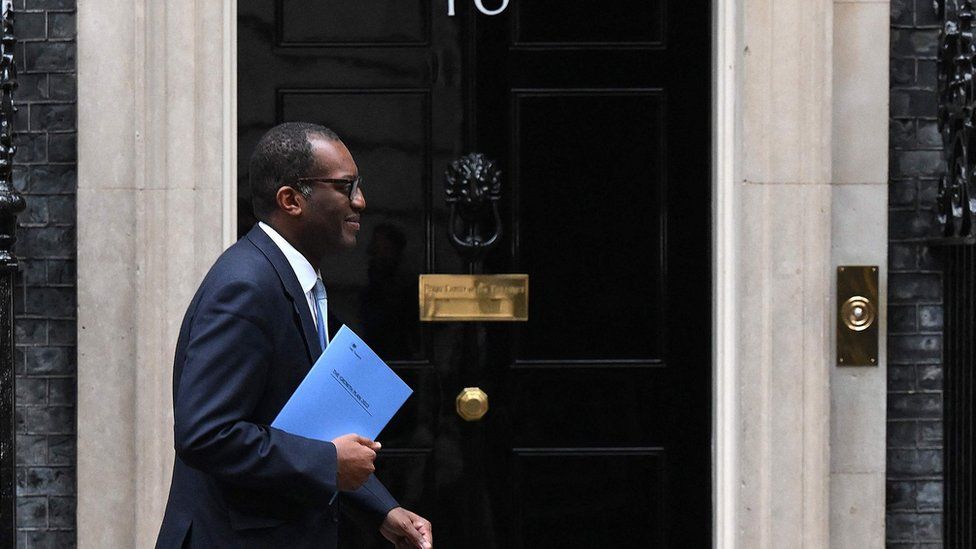The Bank of England has said it will step in to calm markets after the government’s tax-cutting plans sparked a fall in the pound and caused borrowing costs to surge.
It warned that if the market volatility continued there would be a “material risk to UK financial stability”.
The Bank will start buying government bonds at an “urgent pace” to help restore “orderly market conditions”.
The pound tumbled to $1.0586 after the news, down 1.4% against the dollar.
It comes after the currency hit a record low on Monday following the chancellor’s mini-budget.
The Bank has already said it will “not hesitate” to hike interest rates to try and protect the pound and try and stem surging prices. Some economists have predicted the Bank of England will raise the interest rate from the current 2.25% to 5.8% by next spring
The projection has pushed borrowing costs higher, leading hundreds of mortgage products to be taken off the market.
Since the chancellor’s mini budget on Friday, investors have been demanding much higher interest rates to lend to the government through Treasury bonds or “gilts”. But the Bank now hopes to lower these prices by stepping in as a buyer.
Gilt yields fell back after the bank’s intervention.
The Bank said its bond purchases would be “time limited” and carried out on “whatever scale is necessary” to ease investor concerns.
It will also postpone the planned start of a gilt sale programme that was only announced last week.
Paul Dales, chief UK economist at Capital Economics, said the Bank had been forced to step in to avoid the early stages of a financial crisis and warned fears over the economic outlook were growing.
“This shows that the Bank is going to do all it can to prevent a financial crisis and it is already working. While this is welcome, the fact that it needed to be done in the first place shows that the UK markets are in a perilous position.
“It wouldn’t be a huge surprise if another problem in the financial markets popped up before long. Either way, the downside risks to economic growth are growing.”
“The purchases will be unwound in a smooth and orderly fashion once risks to market functioning are judged to have subsided,” the Bank said in a statement.
Government bond yields – the effective cost of government borrowing – especially at longer borrowing durations, have spiked in the past few days as investors continue to worry about the UK economy.
It comes after the government pledged $45bn worth of tax cuts, funded by borrowing, as part of a plan to boost economic growth.

Concerns about the plan’s affordability have knocked investor confidence in the UK economy, driving the pound to a record low of $1.0350 on Monday.
Some analysts have warned it could even reach parity with the dollar.
There has been widespread criticism of the government’s plan, with International Monetary Fund warning on Tuesday that the measures are likely to fuel the cost-of-living crisis and increase inequality.
The government says it will not reverse its tax cuts, but has promised to release further plans to boost growth and reduce public debt in the weeks and months ahead.
In a statement, the Treasury acknowledged global financial markets had seen “significant volatility” in recent days.
“The Bank has identified a risk from recent dysfunction in gilt markets, so the Bank will temporarily carry out purchases of long-dated UK government bonds from today [28 September] in order to restore orderly market conditions,” a spokesman said.
It added that the chancellor was “committed” to the Bank’s independence, adding: “The government will continue to work closely with the Bank in support of its financial stability and inflation objectives.”


This is an immense show of force from the Bank of England trying to calm borrowing markets. It does raise some questions.
It underlines that this is a crisis, and the Bank has responded in emergency mode. The clear cause of this crisis was the chancellor’s mini budget, leading to a loss of market confidence and spiralling borrowing rates on government debt, which it says could become a “material risk to financial stability”.
So it will now, for a temporary period, buy up those loans in unlimited quantities. The effective interest rate being charged to the UK government in these markets was spiralling to 20 year highs. That has now fallen back.
But it was not a decision made by the Bank’s Monetary Policy Committee, who were informed of the decision after it was made by the Bank’s financial experts. It actually comes as as Committee had been set to enact the exact reverse policy – selling government debts. The process was due to start next week and has been delayed.
It is a massive intervention, but it could confuse markets about the clarity of policy making and lines of accountability. Sterling has fallen sharply again, close to all time lows. This will not solve the government’s problems. It might buy them some time.




















